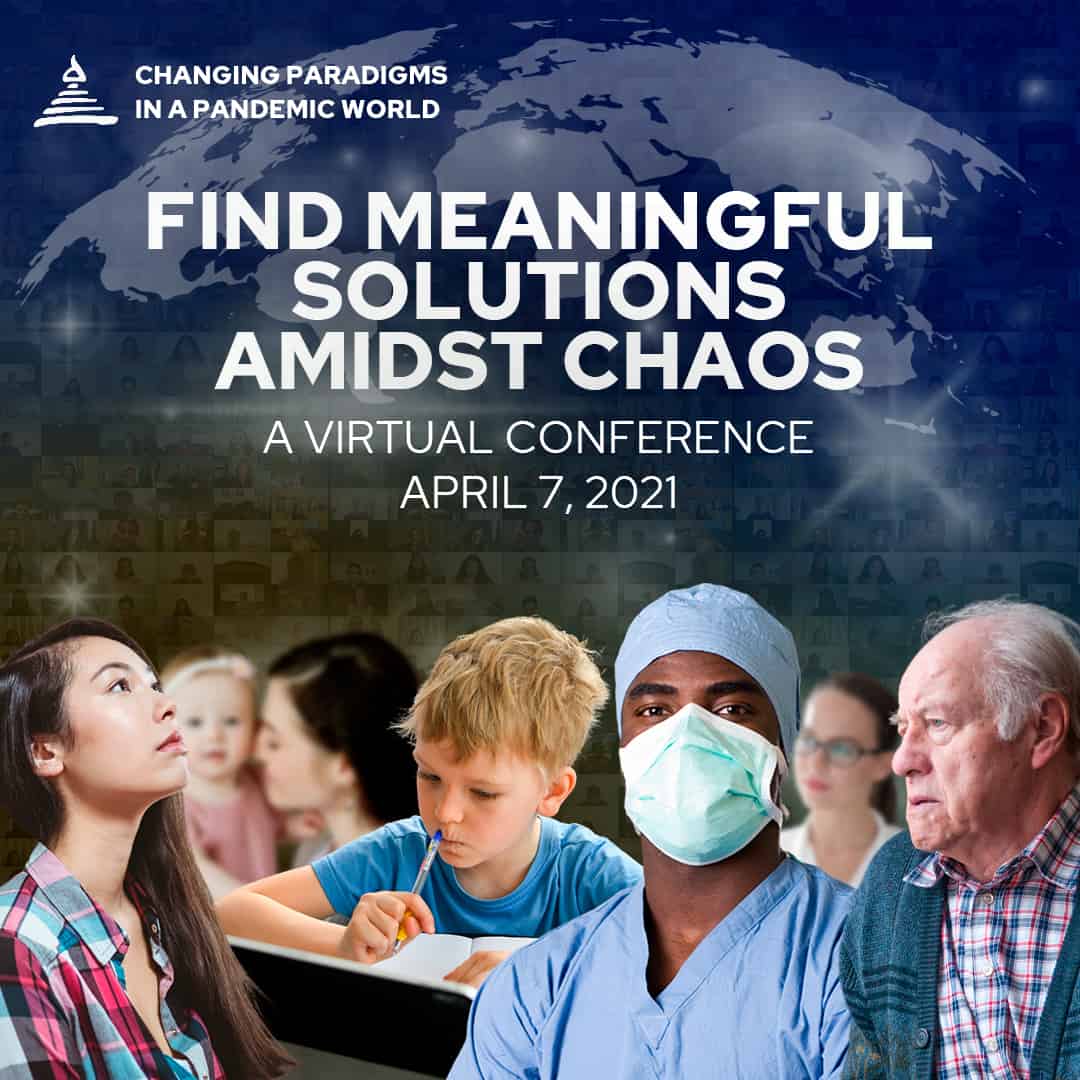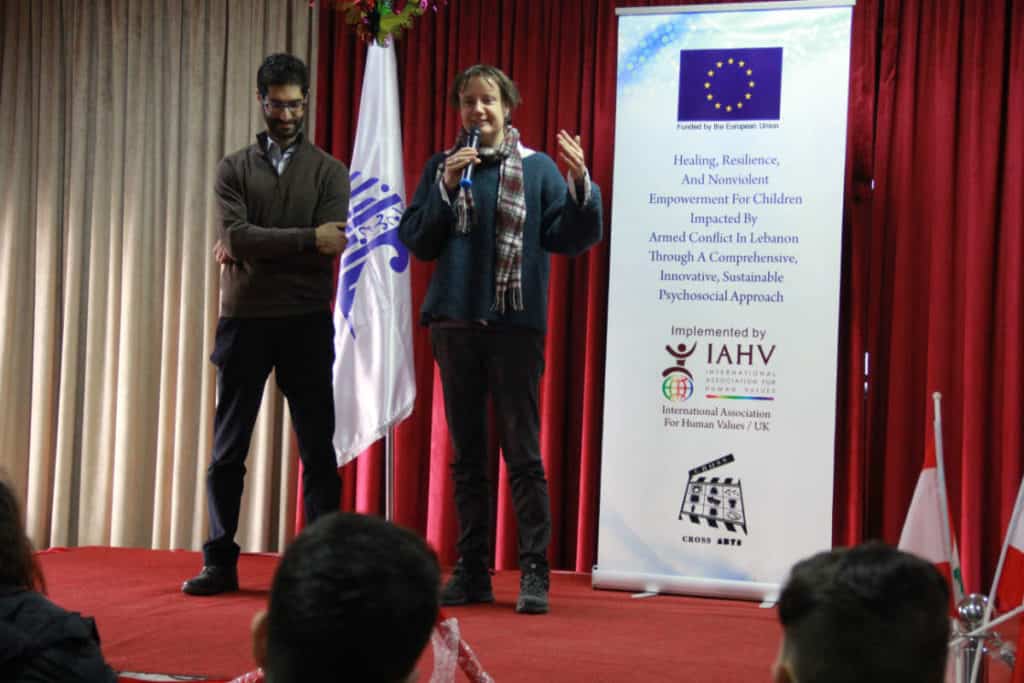Strengthening Mental Health at the Core of Peacebuilding, Development and Humanitarian Work
A panel organised during a global virtual conference on "Changing Paradigms in a Pandemic World” 7 April 2021 from 1:00 to 6:00 pm CEST

Background
This session will unpack the lessons from the pandemic and underline the importance of mental health and psychosocial support in peace building, sustainable development and humanitarian assistance. Subject experts and development leaders will present a tried and tested blue print for individual and societal resilience and look back on best practices, stories and lessons learned, involving war survivors, prisoners, students, refugees and frontline workers. Together we will outline a holistic approach to development that goes beyond economic parameters and incorporates personal and societal happiness alongside mental well-being.
Speakers:
- Mr. Darshak Hathi, President, International Association for Human Values
- Dr. Raffi Gregorian, Director and Deputy to the Under-Secretary-General, United Nations Office of Counter-Terrorism
- Dr. Dara Ghahremani, Assoc. Research Professor, Psychiatry and Behavioral Sciences, University of California, Los Angeles
- Ms. Filiz Odabas-Geldiay, Executive Director, IAHV USA
- Dr. Katrien Hertog, Director, IAHV Peacebuilding Program
- Ms. Marriet Schuurman, Director, Dept. for Stabilization and Humanitarian Aid, Dutch Ministry of Foreign Affairs
- Ms. Nika Saeedi, Team Leader, a.i. Prevention of Violent Extremism and MHPSS Focal Point, Global Policy Network, UNDP
- Dr. Heide Rieder, MHPSS Programme Manager, International Organization for Migration
- Ms. Friederike Bubenzer, Sr. Project Leader Peacebuilding Interventions Program, Institute for Justice and Reconciliation
- Ms. Charmaine Cu-Unjieng, Executive Director, IAHV Philippines
Moderator: Ms. Rugmani Prabhakar, Head of Sustainable Development, The Art of Living

Darshak Hathi is the International President for the International Association for Human Values (IAHV). The organisation founded in 1997 leads in sustainable development, peace and conflict resolution and facilitates humanitarian dialogue. Under his leadership, the organization led a large scale and immediate global response to the pandemic in 2020.
Darshak is an experienced leader and has been responsible for overseeing strategy setting and implementation, steering development projects, expanding the operations of the organisation globally while serving as International Director at the Art of Living Foundation.
For over two decades at the Art of Living, he played a fundamental role in initiating and managing the organization’s relationship with local and national governments in India and globally; worked with bilateral and multi-lateral organisations in India to develop grassroots level initiatives and engaged directly with top political leaders of the country advising on various social issues that needed resolution.
He has been part of several historic peace delegations including in Colombia, Nepal, and Venezuela.
Today, his passion is to motivate, mentor and coach current and future generation of leaders and is currently working with various governments and the top tier Fortune 500 companies with results based solutions for mental wellbeing, stress, addictions and anxiety in a post pandemic world.

Raffi Gregorian brings to the United Nations over 33 years of academic, diplomatic and military experience in counter-terrorism and international peace and security. Until September 2019, when he was appointed Deputy to the Under-Secretary-General of the United Nations Office of Counter-Terrorism (UNOCT), he was Director of Multilateral Affairs in the Bureau of Counterterrorism of the United States Department of State. Prior to that, Mr. Gregorian held different senior positions in the United States Department of State, including Acting Deputy Coordinator for Counterterrorism and Director for the Office of Peace Operations, Sanctions, and Counterterrorism from 2012-2015. In this latter capacity, he initiated the first new U.S. peacekeeping policy in 25 years, led a number of important peacekeeping reforms, and helped secure full funding for the UN peacekeeping budget. Mr. Gregorian’s field experience includes leading two multinational missions in Bosnia and Herzegovina (BiH) as well as military service in both BiH and in Kosovo. In BiH he was Principal Deputy High Representative (2007-2010) and for several months also Acting High Representative as well as Supervisor of Brčko District (2006-2010), having also served as Political Advisor for NATO Headquarters Sarajevo and Co-Chairman of the BiH Defense Reform Commission (2004-2006). His previous State Department service included serving as chief of staff to the Special Adviser to the President and Secretary of State for Kosovo and Dayton Implementation and Acting Director for Kosovo Implementation. Mr. Gregorian holds a Doctorate in International Relations and Strategic Studies from the Johns Hopkins University School of Advanced International Studies, a Masters of Arts in War Studies from King’s College London, and a Bachelor of Arts with Honours in History from the University of Pennsylvania. He is the author of several academic publications.

Dara G. Ghahremani, Ph.D. is a research professor and neuroscientist in the Department of Psychiatry & Biobehavioral Sciences at UCLA (University of California in Los Angeles). His research aims to understand self-regulation, its brain basis, it's role in mental health problems, and how it may be strengthened using non-pharmacological interventions. He has been studying the impact of breathing techniques on behavioral and brain measures of self-regulation in adolescents and adults who are healthy and those who have problems with addiction. He was a Steering Committee member of Rewiring the Brain for Peace, a project of Alliance for Peacebuilding funded by the U.S. Institute for Peace with the goal of proposing neuroscience-based solutions to support the field of peace building.

Filiz Odabas-Geldiay is the executive director of IAHV USA and leads the organization’s governance, strategic partnerships, and public relations. In this capacity, she has also overseen the implementation of several of IAHV’s federal grants for women’s empowerment programs in Iraq since 2004. She also serves as the director of government relations for the Art of Living Foundation, interacting with top political leaders. Her engagements include serving on the Secretary’s Subcommittee on Women at the US State Department’s Advisory Committee on International Economic Policy (ACIEP) and the Lessons Learned Working Group at US Institute of Peace. Formerly, she partnered with UNICEF to engage students globally with service projects as the founder and executive director of the World Children’s Day Foundation. A former journalist, her articles were published in the Washington Post and Nation’s Business. As an advocate for women and children, she spoke at the UN General Assembly, and the U.S. Department of State, among others. She was selected as one of the Nation’s Top 90 Women Mentoring Leaders at the Global Women Mentoring Summit and received the Vishalakshi Award from the Art of Living Foundation. Filiz holds M.A. in Communications and Conflict Management from American University and leads courses on stress-management, meditation and silent retreats.

Dr. Katrien Hertog is a peacebuilding researcher, trainer and practitioner with 20 years of experience in the academic and non-governmental sector.
In her capacity as Director Peacebuilding Programs for IAHV, as well as a researcher, she has been pioneering the practice of psychosocial peacebuilding (PSPB) for more impactful peacebuilding practice and advocating for its integration in international peacebuilding policy and practice. She develops, implements and advocates for PSPB programs on preventing and transforming violent extremism, trauma relief to break the cycles of violence, strengthening mediation and reconciliation processes, and training peacebuilding personnel.
Dr. Hertog has a MA in Peace Studies from the University of Bradford and a PhD from the Centre for Peace Research at the University of Leuven.
As a trainer in peacebuilding, rehabilitation, stress management and capacity development, she has trained 1500+ people, including UN and EU personnel, Dutch and UK government, NGO's and CSO's, students, journalists, refugees and prisoners.

Marriët Schuurman is Director Stability and Humanitarian Aid in the Dutch Ministry of Foreign Affairs. Previously, she acted as the Human Rights Ambassador of the Ministry and coordinated the Dutch membership of the UN Security Council, in 2018. Between 2014 and 2017, she served as NATO’s Special Representative for Women, Peace a

Nika Saeedi is Team Leader - Prevention of Violent Extremism as part of the Conflict Prevention, Peacebuilding and Responsive Institutions (CPPRI) team. Nika leads UNDP workstream on Mental Health and Psychosocial Support and use of Behaviour Science in effective and evidence-based interventions. She serves as the focal point on Hate Speech, and Religion, and Religion and Development, at the United Nations Development Programme (UNDP) in New York.
Leveraging her educational background on Religion and Culture and with over 18 years of experience, Nika has identified opportunities to influence and articulate global policy and programme solutions and forge partnerships to attract resources to across all aspects of the prevention agenda including PVE, peacebuilding, governance, and women, peace and security (WPS). In addition to her work at the global level, Nika has worked in a variety of country contexts.
Nika has led development of several global study including ‘Invisible Women: Gendered Dimensions of Return, Reintegration and Rehabilitation’, conducted in partnership with the International Civil Society Action Network to respond to a pressing need for action-oriented research that improves our understanding of women’s roles in reintegration and rehabilitation processes, and the work of women-led organizations in supporting these processes.
Nika’s support to Government of Afghanistan in reformulating the local governance structure led to a 25% increase in Afghan women’s leadership in local governance. She guided an Afghanistan sub-national consultation process, promoting inclusion of women and minorities, and leading to a level of participation of women that exceeded the target set by the Ministry of Women’s Affairs by 39% in 34 provinces.
Nika designed and managed a results-based family planning project to improve family planning practices throughout Afghanistan, in collaboration with the Ministry of Public Health and in coordination with the Ministry of Women's Affairs. The project design was selected as the most successful family planning project in Afghanistan. As result the Contraceptive Prevalence Rate in 13 provinces increased from 9% to 40% in 2006.

Heide Rieder is a clinical psychologist with 15 years of experience in conducting research, and developing and implementing Mental Health and Psychosocial Support (MHPSS) programmes in Germany and in Rwanda, Burundi, Kenya and South Sudan. Her work focuses on the integration of MHPSS into peacebuilding and vice versa. She currently coordinates the MHPSS programme of the International Organization for Migration (IOM) in South Sudan and chairs the MHPSS Technical Working Group. She holds a doctorate degree in Clinical Psychology from the University of Konstanz in Germany and is a licensed psychodynamic psychotherapist.

Friederike Bubenzer is Senior Project Leader in the Peacebuilding Interventions Programme at the Institute for Justice and Reconciliation in South Africa. In this capacity she contributes to peacebuilding, social cohesion and reconciliation processes with policy makers and civil society leaders in Africa. Friederike leads IJRs research on the interconnectedness between mental health and psycho-social support (MHPSS) and peace building, working with community leaders and policy makers to develop and advocate for an integrated approach to the fields.

Charmaine Cu-Unjieng is the Executive Director for IAHV Philippines. She received her training in Epidemiology and Public Health from Yale University and Medical Anthropology from the University of Amsterdam. She has 21 years of experience working in global health, development, peacebuilding, and humanitarian assistance. She has worked for several international and local organizations such as UN Philippines, UNAIDS, Asian Development Bank (ADB), Management Sciences for Health, and Gawad Kalinga. For 8 years, she worked at ADB to mainstream HIV prevention into the infrastructure sector, advising and working with ASEAN, governments, UN agencies, and development partners on the topic. She is the co-founder of Yoga for Life Foundation, which teaches yoga and meditation to people affected by HIV and AIDS. She is a stress management and mental resilience trainer for Art of Living and IAHV.

